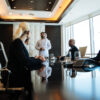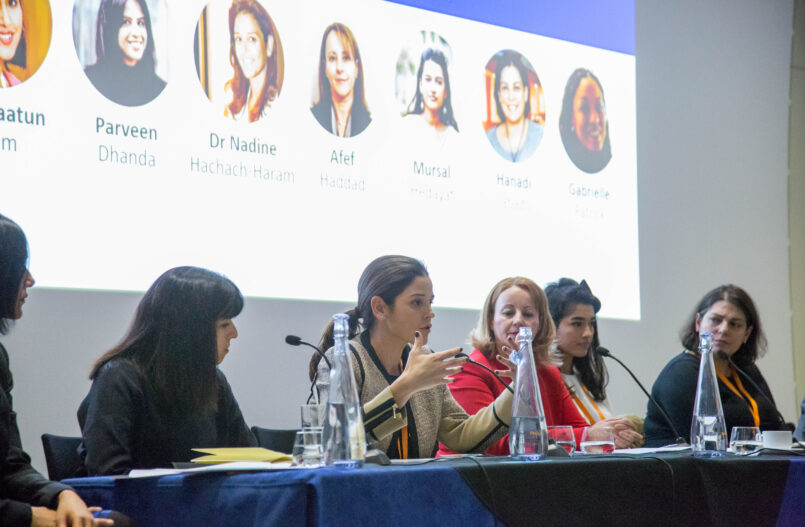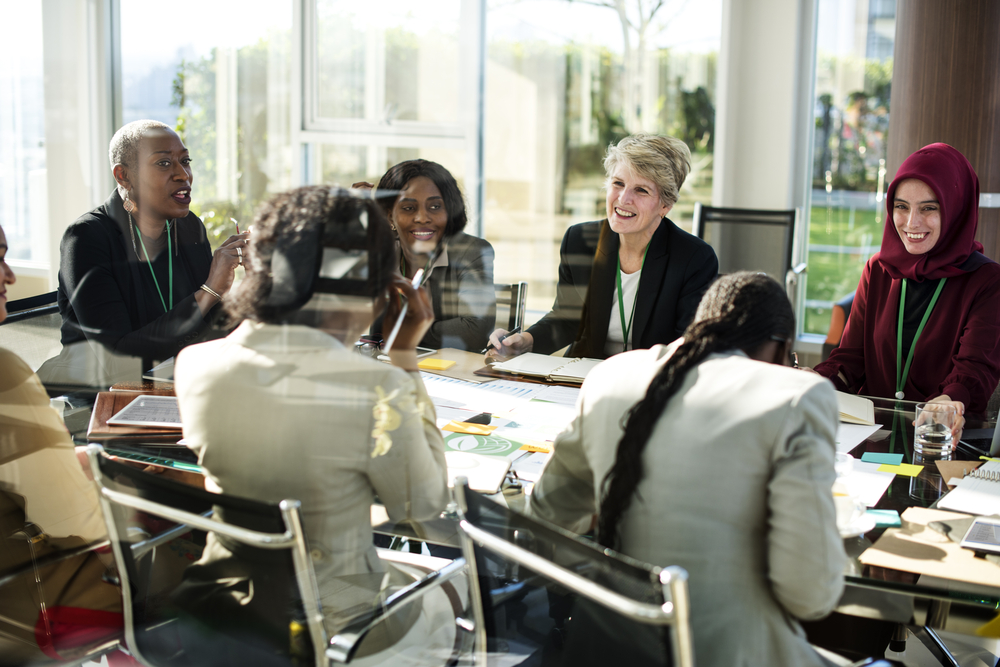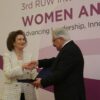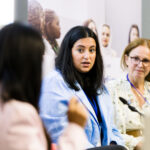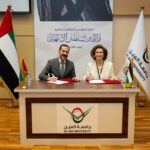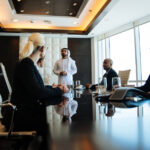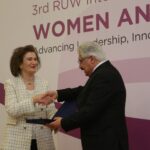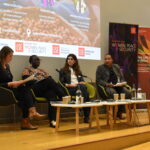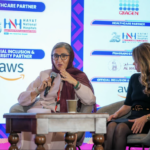The Arab International Women’s Forum (AIWF) held a highly successful 10th edition of the Young Arab Women Leaders conference series on 11 December 2017 in London on ‘Women Led Innovation in STEM’, in partnership with the Royal Academy of Engineering, PwC and the World Bank, and with the valued support of PepsiCo and Shell.
AIWF and PwC jointly launched the Young Arab Women Leaders initiative in London in 2011 as a platform to bring women leaders and mentors from government, business, and civil society together with women who aspire to community, business and political leadership. Six years on, Young Arab Women Leaders is one of AIWF’s keystone empowerment initiatives which to date, has welcomed over 2,500 young women leaders to conferences held thus far in events in Amman, Beirut and Dubai in 2012, Palestine in 2013, London in 2014, Doha in 2015, Kuwait City in 2016, and Fez, Morocco in early 2017.
The 10th Young Arab Women Leaders ‘Women Led Innovation in STEM’ conference was designed to promote the development of leadership skills and confidence in the next generation of young women leaders in STEM, welcoming over 200 guests and delegates from over 40 different countries including the US, UK, the EU and the Arab States. The conference was hosted at and in valued partnership with the Royal Academy of Engineering in London as Host Partner, and AIWF was proud to continue its longstanding partnership with PwC and all AIWF Global Partners to further scale the initiative and celebrate this important milestone in London, the city in which Young Arab Women Leaders was first launched.
For this conference, AIWF, PwC and the Royal Academy of Engineering enjoyed the partnership and support of the World Bank, building on past collaborations between AIWF and the World Bank to bring into focus challenges and opportunities for STEM women leaders in the MENA region, the UK, EU and internationally. AIWF Benefactor Partner PepsiCo and AIWF Global Partner Shell also lent valued support to ‘Women Led Innovation in STEM’ as Conference Networking Partners. Conference sessions were aligned with the core priority policy areas of AIWF, the Royal Academy of Engineering, PwC, and the World Bank, and included:
- Educating and empowering the next generation of STEM women leaders
- Women-led innovation and new solutions to the global energy, food, water, and climate change crises
- Women-led innovation in medical technologies and healthcare AI
- Supporting diversity, inclusion and innovation in energy, engineering, and infrastructure
- Advancing gender diversity in tech entrepreneurship and the digital economy
The conference Opening Session was addressed by Haifa Fahoum Al Kaylani, Founder & Chairman of the Arab International Women’s Forum, Fellow of the Harvard Advanced Leadership Initiative and Commissioner on the ILO Global Commission on the Future of Work; Philip Greenish CBE, CEO of the Royal Academy of Engineering; Blanca Moreno-Dodson, Head of the Center for Mediterranean Integration, The World Bank; Dr Hayat Sindi, Founder and President, Institute for Imagination and Ingenuity (i2institute), Co-founder & Director, Diagnostics for All, Scientific Advisory Board of the UN Secretary-General and Advisor to the President of the Islamic Development Bank; and Pam Jackson, Regional Deals Leader, PwC Middle East.
In her Opening Keynote, Mrs Al Kaylani cited education as one of the Arab world’s most important success stories, and said: “For many Arab women, not only has education enhanced economic opportunity and engagement, it has helped move gender diversity forward in the region, it has lifted families out of poverty and broken the cycle of under-privilege, deprivation and disenfranchisement.” In almost every MENA country, women are graduating from universities in far greater numbers than men and in subjects such as computer science, engineering and law, in what the World Bank has called a ‘reverse gender gap’. In some Arab countries, the ratio of women to men studying STEM subjects at university is 2:1. In the GCC, as many as 60% of engineering students in some universities are female, compared with 30% in the United States and Europe, according to UNESCO. In many of the oil-rich nations as well as Jordan and Palestine, girls out-perform boys in maths, and in Saudi, girls have long out-performed boys in science for decades according to the World Bank report on Equality of Opportunity in Education in the Middle East and North Africa. In 10 Arab countries surveyed by UNESCO, women graduating in STEM subjects represented between 34% to 57% of graduates – much higher than any country outside of the Arab world.
Mrs Al Kaylani discussed empowerment barriers for women in STEM and called for a “narrowing of the knowledge gap by educating more young women in the sciences, and eliminating diversity barriers for women’s participation and leadership in STEM to close the participation gap”. She said: “In STEM in particular, there are more nuanced barriers to female participation to be addressed. These include the dominance of male staff at the higher levels and a lack of mainstream role models for young women in STEM or rather, the low visibility of successful women in STEM in the media. We must look for more ways to bring the best and brightest women leaders together and work harder to elevate the profile of successful role models who will inspire the next generation of STEM women leaders. In our experience, this can be achieved with advanced mentorship and networking programmes that specifically aim to enhance the capacity and support the progression of women in the field.”
Philip Greenish CBE, then-CEO of the Royal Academy of Engineering, welcomed the gathering to the RAEng and reiterated how proud the Academy was to welcome such diverse and highly accomplished panel speakers. In her keynote address, Blanca Moreno-Dodson, Head of the World Bank Centre for Mediterranean Integration, outlined the mission of the CMI, a multi-partner platform for development agencies, Governments, local authorities and civil society from around the Mediterranean to convene and exchange knowledge, discuss public policies, and identify solutions to key challenges facing the Mediterranean region. Through innovative solutions, the CMI aims to help countries achieve transformative reforms and enhance integration in the Mediterranean region, with youth as the CMI’s overarching theme. AIWF was delighted to have the partnership and support of the World Bank on this occasion, building on numerous past collaborations between AIWF and the World Bank over the last decade since the World Bank hosted the AIWF Annual Conference at its headquarters in Washington DC in 2008.
Dr Hayat Sindi, Founder and President, Institute for Imagination and Ingenuity (i2institute), Co-founder & Director, Diagnostics for All, Scientific Advisory Board of the UN Secretary-General and Advisor to the President of the Islamic Development Bank, delivered the Keynote Address as Guest of Honour, conveying her support for the AIWF mission to empower and develop women innovators across the STEM sectors.
Driven by her desire to more closely link science and social impact, Dr Sindi co-founded a non-profit organisation with a team at Harvard, ‘Diagnostics for All’, which creates innovative, inexpensive, point-of-care diagnostic devices for people in impoverished regions. At the heart of Dr Sindi’s innovation lies a passion to develop an entrepreneurial ecosystem in the Middle East that transcends existing gaps between education and opportunity. In 2011, she launched i2, the Institute for imagination and Ingenuity, to encourage innovation among young people specifically male and female scientists, technologists and engineers. Through fellowships, trainings and mentorships, i2 seeks to empower and inspire the next generation of innovators so that they may realize their dreams and ultimately contribute to Saudi Arabia’s growing economy. In 2013, Dr Sindi was one of the first 30 women to be appointed to the Saudi Arabia’s highest consultative body, the Shura Council, and is one of 25 global experts selected by United Nations (UN) Secretary General Ban Ki Moon as members of the newly constituted UN Scientific Advisory Board providing advice to the UN’s leadership on science, technology and innovation for sustainable development. Dr Sindi is also a Goodwill Ambassador for Sciences at UNESCO, and has participated in numerous events aimed at raising the awareness of science amongst women, particularly in Saudi Arabia and the Muslim World.
Pam Jackson, Regional Deals Leader, PwC Middle East, then concluded the Opening Session with her Keynote as Conference Partner on this occasion, outlining PwC’s commitment to advancing gender diversity in the male-dominated tech and broader STEM sectors and introducing the first panel session. As with previous editions, all five panels of the Young Arab Women Leaders conference in London were designed to be highly interactive, with valuable personal strategies and experiences shared between speakers and delegates and between emerging and established leaders in STEM.
AIWF was proud to welcome among the conference participants some of the UK’s leading women executives, young professionals, academics, representatives of media, government and civil society – all successful, motivated, talented and truly inspirational women leaders in STEM who provided valuable inspiration, mentorship and insight through their interventions, representing multinationals in the private sector, NGOs, social enterprises and world leading universities including the University of Oxford, the University of Cambridge, and Imperial College London.
Panels explored critical topics ranging from STEM education; responses to the global energy, food, water, and climate change crises; women’s advancement in medical technologies and the exciting and rapidly growing area of healthcare AI; opportunities and challenges for women leaders in energy, engineering and infrastructure; and navigating the realities of tech entrepreneurship and the digital economy to pave the way for women innovators in blockchain, big data, and the internet of things.
Dr Hayaatun Sillem, who was appointed CEO of the Royal Academy of Engineering effective January 2018, delivered the day’s Closing Remarks at the conclusion of the fifth and final panel. She said: “The Royal Academy of Engineering has a vision of an inclusive engineering profession that inspires, attracts and retains people from all walks of life. It wholeheartedly supports events such as this to encourage the next generation of diverse leaders.” According to Dr Sillem, only 9% of UK engineers are women and 6% are from Black, Asian and minority ethnic (BAME) groups. Recent Royal Academy of Engineering research shows that both these groups experience the culture of engineering as less inclusive than white and male engineers do. For this reason, the Academy works collectively to address barriers faced by under-represented groups by bringing together employers, professional institutions and others through its Diversity and Inclusion (D&I) Programme. Dr Sillem said: “As a national Academy with a global outlook, it’s also crucial that we learn from similar efforts around the world and share our insights and approaches with international partners. We are proud to have welcomed these talented women from across the UK, the Middle East and North Africa to London in December.”
In both the Arab world and in the UK, new opportunities in STEM are being driven by women leaders with the passion, ideas, confidence and skills to launch new platforms, drive new projects, and work productively and collaboratively. AIWF’s Benefactor Partner PepsiCo and all AIWF Global Partners in the STEM sectors, including PwC, Shell and Pfizer (among others), are wholly committed to recruiting, training and retaining the best STEM talent in the region and internationally, and equally to supporting initiatives such as Young Arab Women Leaders which aim to develop women’s confidence, leadership and entrepreneurial skills, and STEM proficiency.
AIWF is deeply appreciative of the invaluable efforts of all AIWF Global Partners and looks forward to building on the success of ‘Women-Led Innovation in STEM’ in 2018 to support women leaders in STEM to develop new competencies, new connections and engage in valuable dialogue with each other. AIWF will work closely with all stakeholders to follow up in future programmes and initiatives on the key recommendations and impact-driven action points delivered in the day’s deliberations.


